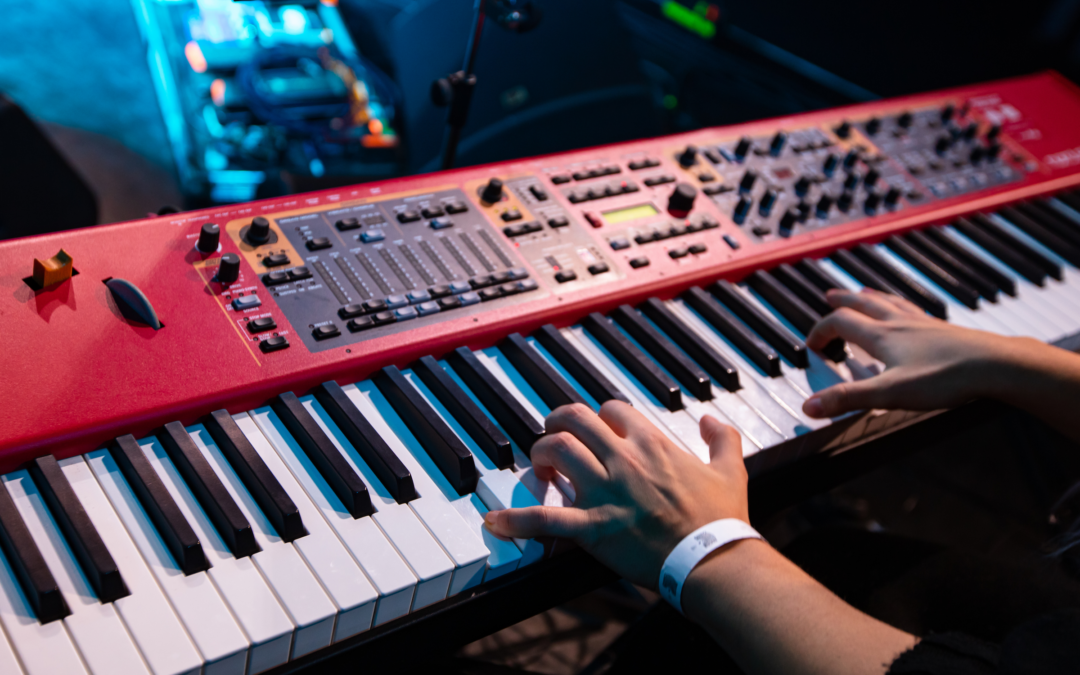The life of a keyboard player in a band is dynamic and multifaceted. It’s not just about hitting the right notes! It is also about being a musical chameleon, a supportive collaborator, and a captivating performer. In any band setting, the keyboardist is often the glue that binds the sound together, adding texture and harmony. To be truly great in this role, a musician needs a diverse skill set that goes beyond technical proficiency, and studying keyboard at Musicians Institute can set you up for success in all of them.
The Art of Collaboration: How to Excel as a Keyboard Player in a Band
Effective communication and collaboration are extremely important for any keyboard player in a band. In a band, you’re part of a team, and the goal is to create a cohesive and fun musical experience. This requires:
- Active Listening: Understanding the other instruments and how they interact is crucial. A great keyboardist in a band listens intently to the drummer’s rhythm, the bassist’s groove, the guitarist’s riffs, and the vocalist’s melody. This allows them to find their place in the mix and complement, rather than compete with, the other musicians.
- Clear Communication: Being able to articulate your musical ideas and understand those of others is essential for a keyboard player in a band. Whether it’s suggesting a chord change, working out a specific arrangement, or discussing the overall feel of a song, clear communication ensures that everyone is on the same page.
- Adaptability: Every band and every performance is different. A keyboard player in a band must be adaptable and able to adjust their playing style to suit the specific context. This might mean playing a simple, supportive pad in one song and taking a virtuosic solo in another.
- Respect and Flexibility: Collaboration involves compromise and a willingness to try new things. A good keyboard player respects the musical contributions of others and is flexible enough to adapt their playing to the needs of the song.
Stage Presence: Beyond the Keys for the Keyboardist in a Band
While musical skill is essential, stage presence is equally important for a keyboard player in a band. You’re not just playing music; you’re part of a visual and emotional performance. Here are some key aspects of stage presence:
- Confidence: Projecting confidence in your playing and your movements can significantly enhance the audience’s experience. This doesn’t mean being flashy or arrogant; it means conveying a sense of assurance and musicality as a keyboardist
- Engagement: Connecting with the audience is vital for a keyboard player in a band. This can be achieved through eye contact, subtle movements, and expressing the emotion of the music through your body language.
- Energy and Dynamics: A dynamic performance keeps the audience engaged. Varying your energy level, both musically and physically, can create a captivating and memorable experience.
- Professionalism: Being prepared, punctual, and reliable is crucial for any performer. This demonstrates respect for your bandmates and the audience.
Real-World Band Experience at Musicians Institute: Preparing Keyboard Players
Musicians Institute recognizes the importance of these collaborative and performance skills for keyboard players in a band. That’s why MI’s programs, including the Keyboard Program, emphasize practical, real-world band experience.

Blog Post
"*" indicates required fields
By submitting this form, I authorize Musicians Institute (MI) to make or allow the placement of calls, emails, and texts to me at the phone number that I have provided, including through the use of automated technology, or a prerecorded or artificial voice. I understand that I am not required to provide my phone number as a condition of purchasing any property, goods, or services. I agree to the terms of MI’s Privacy Policy. MI will not sell or rent your information to third parties, and you may unsubscribe at any time.
MI provides students with numerous opportunities to develop their skills in live performance workshops and ensemble classes. These classes simulate real-world band scenarios, allowing students to:
- Play in Diverse Ensembles: Students have the chance to perform in various band configurations and musical genres, from rock and pop to jazz and R&B. This exposes them to different playing styles and challenges them to adapt to diverse musical contexts as a keyboard player in a band.
- Develop Stage Presence: Through regular performances, notably our Live Performance Workshops, students gain confidence and learn how to connect with an audience. They receive feedback on their performance, both musically and visually, helping them to refine their stage presence as a keyboardist.
- Hone Collaboration Skills: Working closely with other musicians in a band setting, students develop essential communication, listening, and collaboration skills. They learn how to arrange parts, rehearse effectively, and work as a team to create a polished and professional sound.
- Build a Network: Performing with other musicians provides valuable networking opportunities. Students connect with potential bandmates, collaborators, and industry professionals, which can be invaluable for their future careers as a keyboard player in a band.
In conclusion, the role of a keyboardist is far more than just playing the notes. It’s about being a skilled collaborator, a dynamic performer, and a versatile musician. Musicians Institute provides aspiring keyboard players with the tools and experiences they need to excel in this challenging and rewarding field, equipping them with the skills and confidence to thrive in any band setting.

